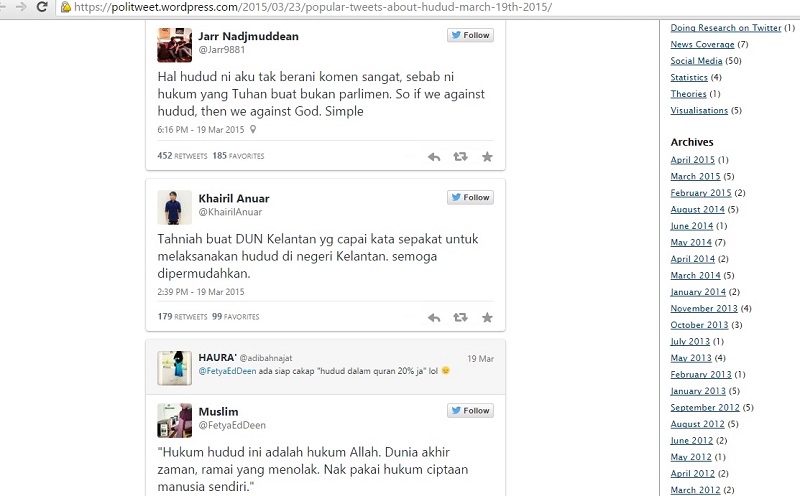KUALA LUMPUR, April 22 — A large number of Twitter users in Selangor and Kelantan are strongly in support of the implementation of the Shariah criminal law or hudud, believing it to be their religious obligation to do so, according to a study on the trend by a local social media research firm.
In an opinion-based analysis of 851 Twitter users who actively commented on the issue in the two states, Politweet found that hudud was supported by nearly 95 per cent or 375 people in Kelantan and a little over 76 per cent or 346 users in Selangor.
The study was carried out between March 18 and 22, around the time that the Kelantan state assembly passed amendments to the Shariah Criminal Code II 1993 on a majority vote, to pave the way for implementation of hudud in the state.
“However, much of this support does not indicate the users were aware or concerned about how the law was to be implemented.
“For most of them, supporting hudud was a matter of fulfilling religious obligations,” said Politweet researcher Ahmed Kamal.
Twitter users in the two states that supported the law gave a long list of reasons for why hudud must be given support, including claiming it would be a sin for Muslims not to back the Islamic penal code, among others.
They also argued that hudud is Allah’s law so opposing it would be tantamount to opposing Allah, and that the Islamic criminal justice system should be implemented in Malaysia because it is an Islamic country.
In contrast, there was a much smaller group from among the accounts studied that did not support hudud — eight (2.02 per cent) from Kelantan and 63 (13.85 per cent) from Selangor.
These dissenters questioned whether hudud would be implemented fairly and argued that there were other more pressing issues that should be pursued.

They also said it was not the correct time to implement hudud.
Only a few, however, said that implementing hudud would go against the Federal Constitution, and even less said that it was not right for a country with a plural community and different religions.
The remaining accounts, which include 13 (3.28 per cent) from Kelantan and 46 (10.11 per cent) from Selangor, were undecided on the controversial topic. These accounts also include those who asked for more information about the Islamic penal law.
Ahmed said the assumption is that the majority of the Twitter accounts covered by the study were Malays as nearly all the tweets collated were written in Bahasa Malaysia.
The results also reflected a young demographic, with their ages estimated to range between 18 and 30 years old.
“The topic drew greater interest from the younger generation within the demographic,” he said, referring to university and college students.



















